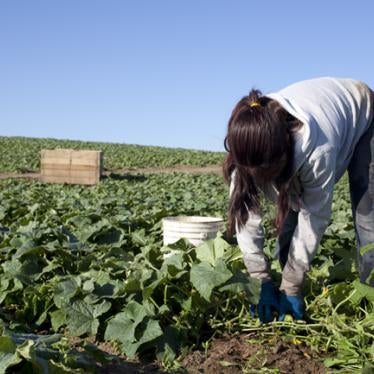The tobacco giant Philip Morris International has adopted a change in policy that could protect many child workers from danger on tobacco farms in the United States.
Philip Morris International, which sells Marlboro among other leading cigarette brands, announced on November 5, 2014 that it will begin buying US-grown tobacco exclusively through third-party leaf supply companies, rather than directly from tobacco farmers. This change will require the world’s largest tobacco leaf suppliers – Alliance One International and Universal Corporation – to implement Philip Morris International’s detailed child labor policy on all US farms from which they purchase tobacco. Of the world’s 10 largest tobacco companies, Philip Morris International has the most rigorous standards, prohibiting children under 18 from many of the most hazardous tasks on tobacco farms.
“Philip Morris International’s new purchasing model means thousands of US tobacco farms will now need to meet higher child labor standards that should protect children from the most dangerous work in tobacco farming,” said Margaret Wurth, children’s rights researcher at Human Rights Watch. “Philip Morris International should carefully monitor suppliers to ensure they know the rules and follow them.”
Human Rights Watch in a May 2014 report found that children working on tobacco farms in the United States are exposed to nicotine, toxic pesticides, extreme heat, and other dangers. Most of the children interviewed reported experiencing nausea, vomiting, headaches, or dizziness while working – symptoms consistent with acute nicotine poisoning.
Weak protections under US law allow children as young as 12 to work unlimited hours outside of school on tobacco farms of any size, and there is no minimum age for children to work on small farms. Despite the known risks of nicotine poisoning, there are no special provisions in US laws or regulations to protect children from the unique hazards of tobacco work.
Universal Corporation is the world’s largest leaf merchant company, handling 25 to 35 percent of the tobacco produced in North America. Alliance One International, the other major leaf merchant company operating in the US, contracted with 1,074 tobacco growers in 2013.
Under Philip Morris International’s new purchasing model, both companies will ban children under 18 from some of the most hazardous tasks, such as harvesting tobacco, pulling the tops off tobacco plants, working at heights, handling pesticides, or working with sharp tools or in extreme temperatures. Philip Morris International should carry out regular and rigorous internal and third-party monitoring to ensure suppliers comply with the company’s child labor standards.
In addition to Philip Morris International, both companies supply US tobacco leaf to other major tobacco product manufacturers, including British American Tobacco, China National Tobacco, Imperial Tobacco Group, Japan Tobacco, and Lorillard.
Other major tobacco companies, including Altria Group and Reynolds American, buy US tobacco directly from individual growers. Reynolds American is the second-largest tobacco company in the US, but has no child labor policy.
Human Rights Watch has urged tobacco companies to prohibit children under 18 from doing hazardous work on farms in their global supply chains, including any work that involves direct contact with tobacco in any form. The Obama administration should issue regulations to prohibit children from performing hazardous work on tobacco farms, and Congress should enact laws to give child farmworkers the same protections as all other working children, Human Rights Watch said.
“All tobacco companies should do more to protect children from the hazards of tobacco farming,” Wurth said. “Each company should adopt policies to prohibit children under 18 from doing hazardous work, including all work that involves direct contact with tobacco.”







